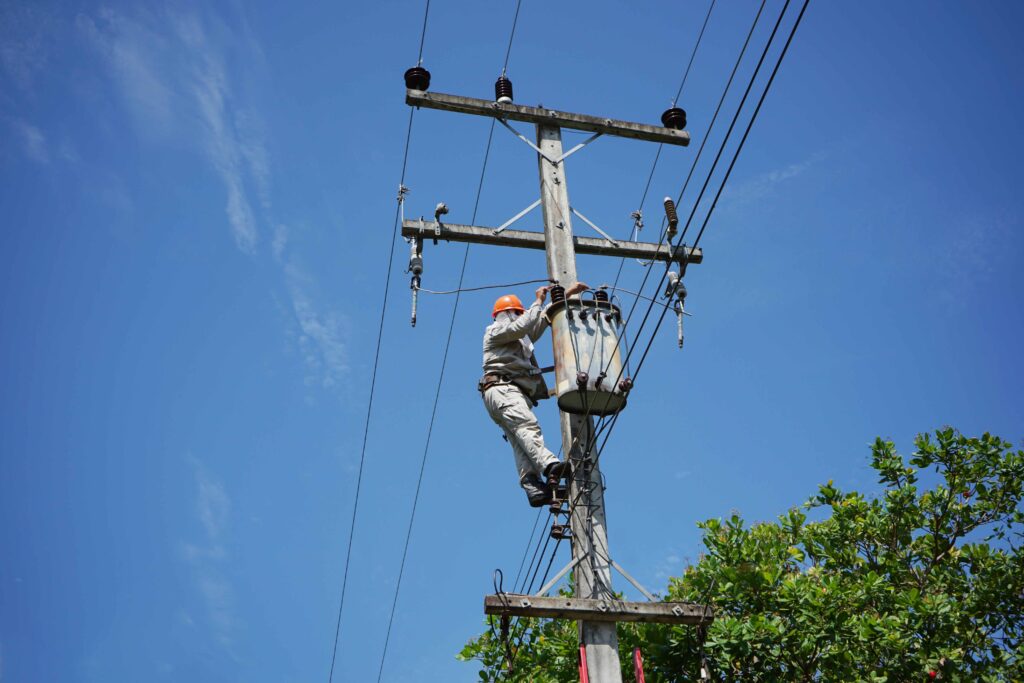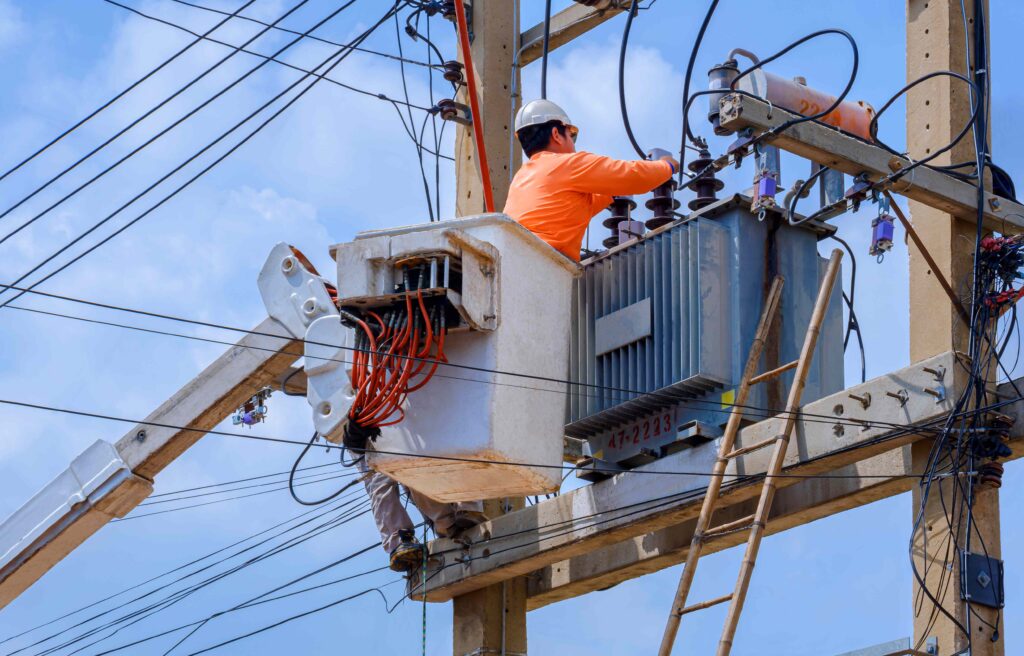A lineman, or electrical power-line technician, installs and maintains electricity distribution and transmission systems. They work to ensure that power reaches homes and businesses reliably.
Linemen play a crucial role in the upkeep of electrical infrastructures that power our cities and towns. Tasked with the construction and maintenance of the network that distributes electricity, linemen must be skilled in both the technical aspects of their trade and the stringent safety protocols associated with high-voltage power lines.
Their job often demands quick response to emergency situations, such as power outages or downed lines due to severe weather, necessitating a strong sense of responsibility and determination. Despite the inherent risks, linemen are committed to providing uninterrupted electrical service, making their work essential to modern life’s conveniences and necessities.
The Role Of A Lineman
Linemen are the unsung heroes of the electrical world. Their job is vital to keeping electricity flowing to our homes and businesses. Let’s discover what it takes to climb the poles and brave the elements to keep the lights on.
Job Description
Linemen build and maintain electrical power systems. They work outdoors, sometimes at great heights. Their tasks include installing electrical poles, laying cables, and repairing lines during outages. Linemen work with a variety of tools and equipment to complete their duties safely and effectively.
- Install and maintain overhead and underground power lines
- Inspect and test power lines and auxiliary equipment
- Identify and fix problems with power lines and related equipment
Skills And Qualifications
A successful lineman needs a mix of skills and qualifications. These include:
| Skills | Qualifications |
|---|---|
| Physical Strength | High School Diploma |
| Attention to Safety | Technical Training |
| Problem-Solving Ability | Certification (e.g., Journeyman Lineman) |
| Teamwork | Apprenticeship Completion |
Moreover, linemen should have qualifications like a high school diploma or equivalent. They often complete a technical training program or apprenticeship. Certifications, such as a Journeyman Lineman card, are also important.
Training And Education
Aspiring linemen must undergo meticulous training and education to master the skills required for this challenging role. This training blends technical knowledge with hands-on experience. No journey begins without a firm step, and for linemen, that step is a blend of formal instruction and fieldwork.
Apprenticeship Programs
Essential for aspirants, apprenticeship programs serve as the cornerstone of lineman education. They typically span four years, offering in-depth practical experience coupled with classroom instruction. Apprentices learn safety practices, electrical theory, and important skills on how to climb poles and manage equipment. Below is an outline of what such a program encompasses:
- 2000 hours of on-the-job training per year
- 144 hours of technical training per year
- Hands-on experience in various weather conditions
- Mentorship with experienced linemen
Completion of an apprenticeship unlocks the door to becoming a journeyman lineman, a certified practitioner of the trade.
Certifications
Alongside apprenticeships, certifications further demonstrate a lineman’s prowess. Some prevalent certifications include:
| Certification | Focus Area | Offered By |
|---|---|---|
| Osha Certification | Safety practices | Occupational Safety & Health Administration |
| CDL | Operating heavy machinery | Department of Transportation |
Certifications often require passing an exam and maintaining the credential through continual education. They validate the holder’s ability to meet industry standards. This showcases professional commitment to the craft.
Work Environment
Understanding the work environment of a lineman offers insights into the nature of this essential job. Linemen face unique conditions daily that require strength and resilience. This job is not your usual nine-to-five indoors, but rather an adventurous endeavor where each day brings new challenges.

Outdoor Work
Linemen spend considerable time working outdoors. Regardless of the weather, their job calls for action. The workplace could be atop high poles or deep underground. Work sites vary from rural areas to bustling city streets. Linemen ensure our lights stay on during rain, wind, or shine.
- Varying locations: from remote areas to city centers
- Weather resilience: adapting to harsh conditions
- Travel requirements: ready to move where needed
Physical Demands
The physical demands of a lineman’s job are significant. Daily tasks involve heavy lifting, climbing, and reaching. Continuous focus on safety is paramount, as the risk of injury is present. Maintaining peak physical condition ensures linemen can handle the rigors of their work.
| Physical Task | Description |
|---|---|
| Lifting | Handling heavy tools and equipment |
| Climbing | Ascending poles and towers regularly |
| Reaching | Extending to work on lines and cables |
By understanding the work environment, it becomes clear that linemen are vital to keeping our communities connected and powered. Each day, they showcase commendable dedication in physically demanding and outdoor conditions to ensure reliable access to electricity for all.
Safety Procedures
Safety is the backbone of a lineman’s work. These skilled workers deal with live wires and heights daily. Linemen must follow strict safety rules to stay safe. Let’s dive into the safety measures that keep linemen out of harm.
Hazardous Conditions
Linemen face risky situations, like storms and high voltage. To handle these, they assess the scene first. They look out for:
- Live wires – They check for energized lines.
- Bad weather – They plan work around storms.
- Falling debris – They secure loose materials.
Identifying dangers helps them stay one step ahead.
Protective Gear
Wearing the right gear is vital. It helps linemen avoid injuries. They use:
| Gear | Use |
|---|---|
| Hard hats | Protects their heads from impacts. |
| Gloves | Insulates against electric shocks. |
| Boots | Gives grip and protects feet. |
This gear is just as important as their tools.
Career Outlook
Curious about the future as a lineman? Great news awaits! This vital role powers society. Linemen ensure electricity flows to homes and businesses. Security and growth are prominent in this field. Read on for what lies ahead.
Job Growth
Expect positive trends in lineman job growth. The demand for electricity never halts. Infrastructure development and modernization surge forward. This expansion fuels need for skilled linemen. The Bureau of Labor Statistics notes a steady rise in these roles. Energy reliance guarantees lineman jobs stay critical.
Advancement Opportunities
Hard work pays off for linemen. Start on the ground and climb high. Skilled workers progress to supervisory positions. Dedication can lead to roles like Lead Lineman or Crew Supervisor. Some venture into utility company management. Training and certification open doors further. The sky’s the limit in a lineman’s ascent!
An SEO-optimized, human-like, unique content structured in HTML format with appropriate use of heading tags, paragraph breaks, bolded phrases, and a table if needed. The content focuses on the career outlook for linemen and is structured to be easily readable and helpful.
Job Satisfaction
Job Satisfaction among Linemen is high for several reasons. These skilled professionals install and repair electrical power systems, often working at great heights with heavy equipment. But beyond the technical aspects, there are elements that bring immense fulfillment to their roles.
Teamwork
Teamwork is crucial for linemen. They often describe a strong bond with coworkers; it’s like being part of a family. On the job, they rely on one another for safety and support. Completing complex projects together boosts morale and provides a strong sense of accomplishment.
Community Impact
Linemen make a significant impact on their communities. They work tirelessly to restore power during outages, often braving extreme weather conditions. Communities recognize and appreciate their efforts. Knowing they help keep the lights on offers linemen a deep sense of pride and job satisfaction.
Challenges Of The Job
Linemen face tough challenges every day. These brave workers climb high poles and handle live wires. Their job is vital but never easy.
Weather Factors
Linemen work in all weather conditions. They brace the cold, heat, wind, and rain. Here’s a look at how weather can affect their job:
- Heat can lead to exhaustion and dehydration.
- Cold brings frostbite and slippery surfaces.
- Wind makes high-altitude tasks dangerous.
- Rain and storms increase the risk of accidents.
Emergency Response
Linemen are first responders of the electric world. They restore power during emergencies. Key aspects of their emergency role include:
| Emergency Types | Response Duties | Challenges |
|---|---|---|
| Outages | Diagnose issues and repair lines | Working against time to restore power |
| Storms | Remove fallen trees and debris | Harsh weather and dangerous conditions |
| Accidents | Ensure public safety near electrical hazards | Managing live wires and preventing fires |
Industry Evolution
The field of linework has seen significant changes with the evolving landscape of the energy sector. The industry evolution is evident as linemen today must adapt to new technologies and methods. Let us explore this journey.
Technological Advances
Modern linemen harness cutting-edge tools to enhance efficiency and safety. Advancements in diagnostic equipment enable quick identification of issues. Drones now inspect lines safely. Real-time data analytics improve response times. Smart grid technologies demand skilled linemen to manage complex networks.
- Diagnostic tools for fault detection
- Drones for aerial inspections
- Smart grids requiring specialized knowledge
Renewable Energy Impact
The rise of renewable energy transforms lineman roles. They now install and maintain solar panels and wind turbines. The integration of sustainable sources into the grid creates new challenges. Linemen must learn about these energy forms. They keep power flowing from diverse sources.
- Integration of solar and wind power into existing grids
- Maintenance of renewable energy installations
Training programs now include renewable energy modules. Linemen are vital for a greener future.
Frequently Asked Questions
What Are 3 Things A Lineman Does In A Day?
A lineman installs and repairs electrical power systems, performs routine maintenance on electrical lines, and troubleshoots outages to restore electricity.
What Are The Duties Of Lineman?
Linemen install and maintain electrical power systems and telecommunications cables. They repair wires, climb poles, operate equipment, and ensure safety regulations compliance. Duties also include inspecting power lines and identifying potential hazards.
What Is The Highest Paying Lineman Job?
The highest paying lineman job is typically with major electrical power companies, offering salaries exceeding $100,000 annually for experienced linemen.
Do Lineman Make 6 Figures?
Some linemen, especially those with extensive experience or in higher-paying regions, can earn six-figure incomes. However, this is not universal and often depends on the individual’s level of experience, the employing company, and geographical location.
Conclusion
Linemen play a crucial role in keeping our lives powered and connected. Their expertise ensures electrical infrastructure is safe, functional, and well-maintained. Whether braving heights or stormy weather, these unsung heroes work tirelessly. Remember their vital contribution next time you flick a switch.
Thanks to linemen, our world shines bright.

